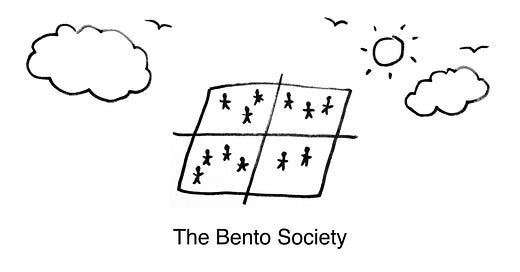Invitation: What gets measured and what doesn't get measured
Hello my friends, and welcome to the Bento Society. I’m Yancey Strickler.
On Friday, the Bento Society will host its second roundtable event on the theme of Data is fire, or how our relationship to data will shape humanity’s course from here. (Here was our first roundtable.) A spectacular panel will gather to discuss What gets measured and what doesn't get measured this Friday, April 23rd, at 12pm EST.
If you’d like to watch the discussion, RSVP here.
The topic
In exploring what gets measured and what doesn’t get measured, our roundtable will focus on five questions:
What values, behavior, and things do we tend to measure? What don’t we?
Who decides what gets measured? Why do we measure what we do?
What’s the impact and what are the implications of being measured?
What are the Do’s and Don’ts for trying to measure a trait or value “well”?
What are values, behaviors, or other qualities we could measure but do not?
We’ll spend between ten and fifteen minutes on each question. Afterwards we’ll invite the audience to ask questions and weigh in.
The panel
Our roundtable will include:
Ashley Amaya (Senior Survey Research Methodologist, Pew Research)
Morgan X’agatkeen Howard (Sealaska board member, Tlinget tribal leader)
Lianne Kerlin (Senior Researcher at the BBC)
Irwin Kula (Rabbi, author, and Director of National Jewish Center for Learning and Leadership)
Pauline Pigot (Senior consultant in Sustainability and Strategy at Deloitte France)
Übeyd Ruff (Technology Transfer Officer at Istanbul Sabahattin Zaim University and a Certified Islamic Finance Executive (CIFE))
Alex Varley-Winter (UK-based investigative journalist)
Salome Viljoen (Soon-to-be Columbia University School of Law Academic Fellow and Lecturer)
+ more
Background
A few things I'm thinking about going into the discussion:
What gets measured is what matters in most organizations. For most organizations measurements all ultimately ladder back to metrics to increase profitability, growth, or a certain public opinion outcome. Most (but not all) measurements have an implicit self-interest tied to them.
Measurement can be a form of control. The potential exploitation of people using data or the exploitation of people’s data can create an imbalance between the measured and the measurers. It’s lower-level employees who are the most monitored and measured. More extreme, in “I helped build ByteDance’s vast censorship regime,” an anonymous Bytedance worker writes about content moderation teams of 20,000 people and hundreds of technical staff monitoring speech across China. This included requests to develop an algorithm that would detect Uyghur speech, then automatically cut off their live stream. A natural language processing algorithm similar to how Alexa or Siri works, but to produce a totalitarian result.
We’re often unclear on what we’re measuring. As came up in our last Roundtable, ESG metrics are described as measuring “sustainability” but this is not actually the case. What we’re measuring and what we’re not measuring are sometimes the same thing! There’s also a lot that Data Can’t Tell Us, as this Hannah Fry New Yorker piece explores, touching on how incentives create counter-incentives and ideas like Goodhart's Law (once a useful number becomes a measure of success, it ceases to be a useful number).
Our data of the world will never be complete. Even in well-established fields like polling, non-responses to surveys greatly affect our understanding of the world. What we don’t see is just as impactful as what we do.
Measurement can exacerbate imbalances by making them more efficient. This is the challenge of AI, facial recognition software, and digital redlining, wherein Facebook will allow real estate agents to block people in certain zip codes from seeing their ads, or where Uber and Lyft drivers are discouraged from picking up riders in areas where people of color predominantly live because the algorithms deem those rides as riskier. What was previously unstated becomes explicit through measurement and digital application.
More measurement and data are here to stay. The 21st century is an explosion in data and measurement, just as the 20th century was and the 19th century before that.
Humanity’s long history — including religion, philosophy, and our social values — has many rich examples of measurement to learn from. This idea of measurement isn’t the newest thing under the sun. If we expand our thinking beyond business and technology, what other ways of thinking about measurement and data emerge?
Together we'll have an engaging dialogue where the brilliant minds around the table will meet. This event will be recorded and shared. This event is part of our larger project to explore the frontiers of value and self-interest.
To RSVP for the live experience, click here.
Also this week at the Bento Society
I’ll be hosting the Weekly Bento this Sunday, April 25, at 12pm EST. This is a space for setting your weekly priorities and reflecting with others. Join me.
Recap your week with the Retro Bento crew on Friday, April 23, at 3pm EST. Join us.
Fancy a Coffee or Tea? (FACT) a community-led space for five people to get to know each other, this Thursday, April 24, at 12pm EST for a casual hang. RSVP here.
Peace and love my friends,
Yancey Strickler
The Bento Society
The Bento Society explores the frontiers of what’s valuable and in our self-interest. We host weekly events for our members and support projects aligned with our mission.



